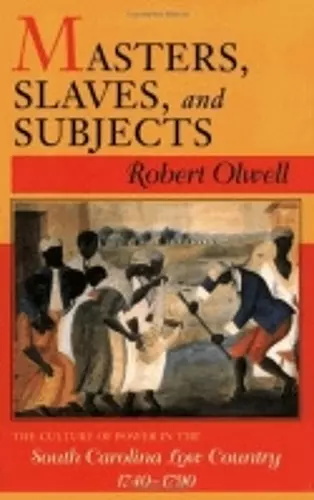Masters, Slaves, and Subjects
The Culture of Power in the South Carolina Low Country, 1740–1790
Format:Paperback
Publisher:Cornell University Press
Published:15th Jun '98
Currently unavailable, and unfortunately no date known when it will be back
This paperback is available in another edition too:
- Hardback£108.00(9780801434884)

The slave societies of the American colonies were quite different from the "Old South" of the early-nineteenth-century United States. In this engaging study of a colonial older South, Robert Olwell analyzes the structures and internal dynamics of a world in which both masters and slaves were also imperial subjects. While slavery was peculiar within a democratic republic, it was an integral and seldom questioned part of the eighteenth-century British empire.
Olwell examines the complex relations among masters, slaves, metropolitan institutions, officials, and ideas in the South Carolina low country from the end of the Stono Rebellion through the chaos of the American Revolution. He details the interstices of power and resistance in four key sites of the colonial social order: the criminal law and the slave court; conversion and communion in the established church; market relations and the marketplace; and patriarchy and the plantation great house.
Olwell shows how South Carolina's status as a colony influenced the development of slavery and also how the presence of slavery altered English ideas and institutions within a colonial setting. Masters, Slaves, and Subjects is a pathbreaking examination of the workings of American slavery within the context of America's colonial history.
"A well-researched and well-written book. . . . A careful reading of sources. . . . An intriguing final chapter. . . . A worthy addition to the scholarship begun by Peter Wood and Edmund Morgan, it is a must for libraries with collections on slavery and the Colonial South."—Choice
"This book sheds new light on the nature and complexity of the master-slave relationship in low-country South Carolina, circa 1760. . . . Olwell's is an excellent book. Not only does it explicate the various ways in which slavery shaped colonial South Carolina and vice versa, it demonstrates one way that history might be written as both a study and a story."—Thomas J. Little, The North Carolina Historical Review. January, 2000.
"Masters, Slaves, and Subjects is an exceptionally fine study of the interplay between slaves and masters. . . Much of this story is familiar, but Olwell also covers new ground, adds rich detail, and reminds us constantly of the slaves' agency and resistance in the everyday tug of war between the dominant and the subordinate. His eloquent study contributes much to our understanding of the 'problem' of South Carolina. . . .Master, Slaves, and Subjects is a superb book."—Jerome Nadelhaft, University of Maine. William and Mary Quarterly, April 2001
"Olwell's book is engaging and well written. . . Olwell's book can be recommended as an interesting study of slavery in colonial and revolutionary South Carolina."—Labor History
"Robert Olwell's book is one of the most insightful and interesting books on early America to appear in some time. . . All in all, this is a first-rate work in cultural history. Gracefully written, well researched, and ingeniously plotted, the study marks the debut of a prodigious young talent in the field of early American history."—Peter A. Coclanis, University of North Carolina, Chapel Hill. American Historical Review, June 2000.
"Familiar primary sources are fresh in Olwell's hands. . . This book is . . . engagingly, even elegantly written.—Journal of American History
"Olwell blazes a new path by showing how South Carolina's colonial status influenced the development of slavery and how slavery altered or modified English institutions within a colonial setting. He considers four pillars of colonial society: the church, the law, the market, and patriarchy, and shows how each was peculiarly affected in a new environment in association with a strange institution that became normative."—Daniel C. Littlefield, author of Rice and Slaves: Ethnicity and the Slave Trade in South Carolina
- Winner of Honorable Mention, Frederick Douglass Book Prize (.
ISBN: 9780801484919
Dimensions: 229mm x 152mm x 22mm
Weight: 454g
320 pages